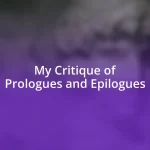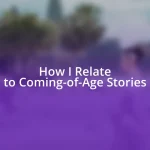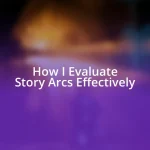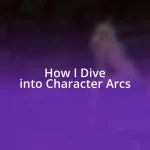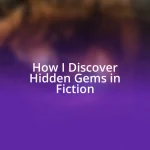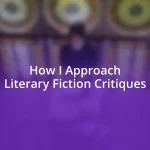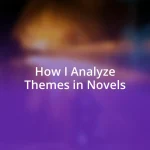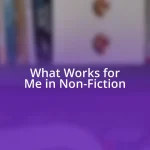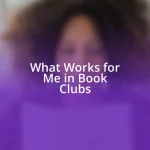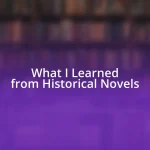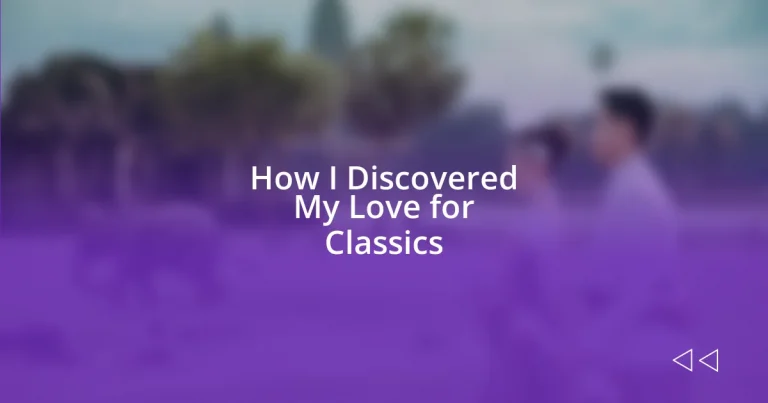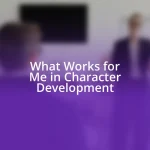Key takeaways:
- Early exposure to classics ignited a lifelong passion for literature, with impactful works like “Pride and Prejudice” and “Moby Dick” shaping personal reflections and insights.
- Engaging in diverse study experiences and discussions, such as analyzing ancient texts and hosting themed readings, deepened understanding and appreciation of literary themes.
- Creating a community around classics through book clubs, online platforms, and experiential events enhanced connections to literature and transformed reading into a collective journey of discovery.
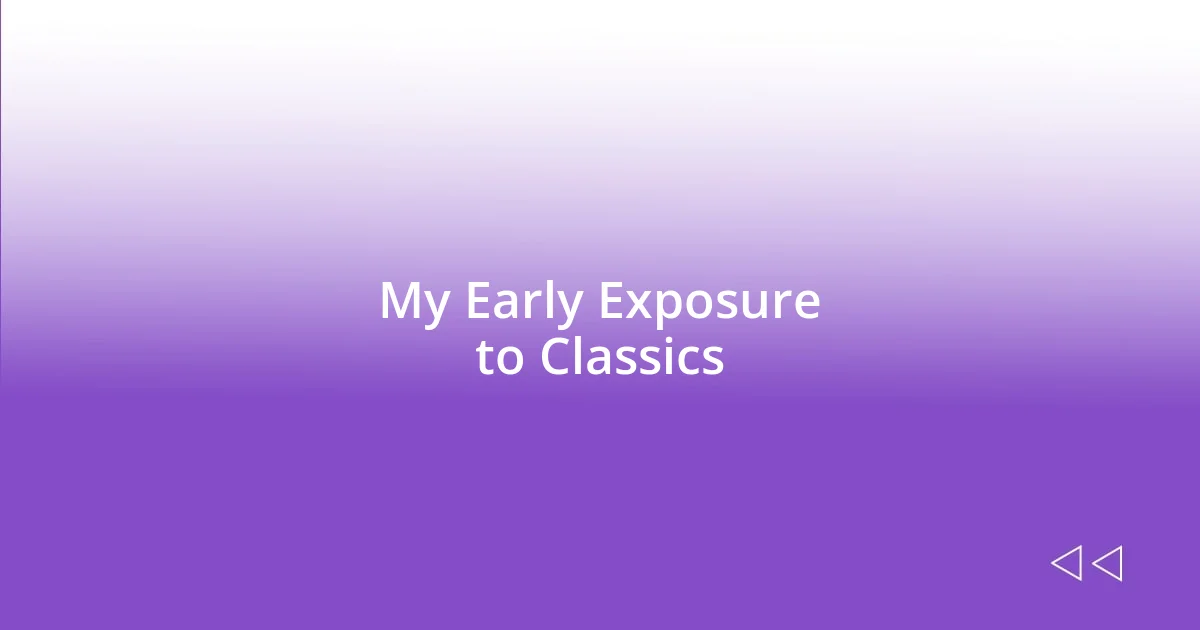
My Early Exposure to Classics
As a child, my weekends were often filled with dusty old books that belonged to my grandmother. I remember flipping through the pages of her worn copy of “Pride and Prejudice.” The elegance of Elizabeth Bennet’s wit and the tension in her relationship with Mr. Darcy captivated me. Have you ever been drawn into a story so deeply that you felt like you were part of it? That’s how I felt with every chapter.
In high school, I stumbled upon Shakespeare while rehearsing for a school play. The richness of his language was both intimidating and exhilarating. I still recall the thrill of delivering my first line as Romeo, and the surge of emotion that came with embodying a character teetering on the brink of love and tragedy. Isn’t it fascinating how dramatic words from centuries ago can still resonate with us today?
My exposure to the classics didn’t stop there; I often visited my local library, which had a dedicated section just for them. Each visit felt like a treasure hunt, discovering tales of bravery, tragedy, and passion that were just waiting to be explored. It was during those quiet afternoons, surrounded by towering shelves, that I realized the timelessness of these stories and how they mirrored the complexities of my own life. Do you remember the first classic that made you reflect on your experiences?
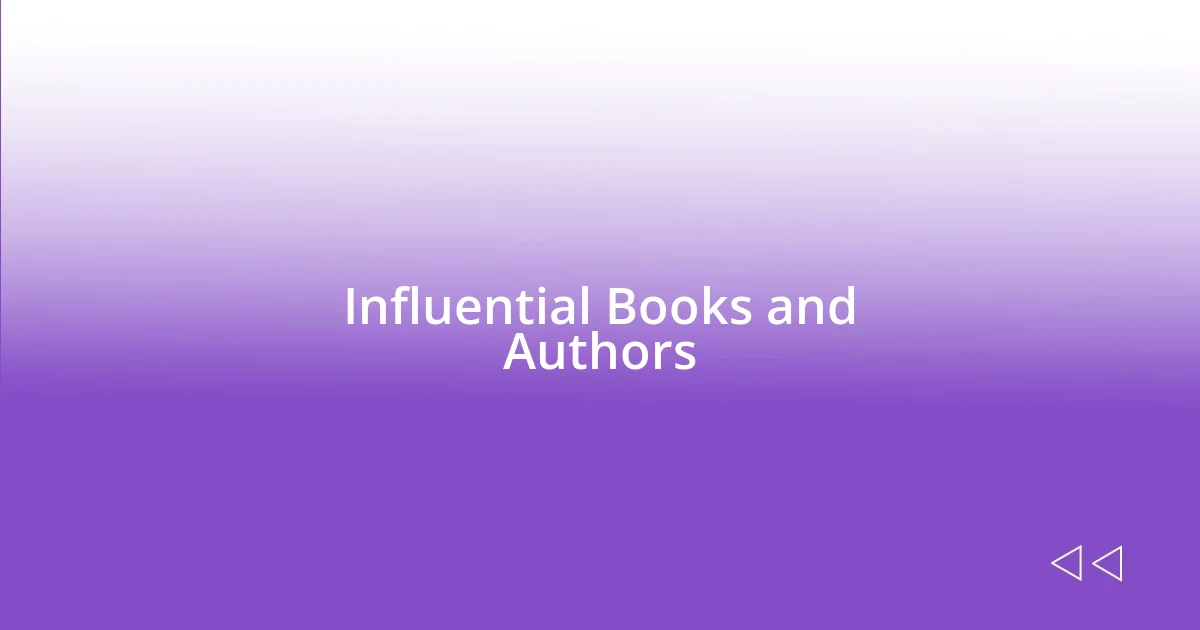
Influential Books and Authors
Reading has always been a doorway for me into the lives of others, and certain authors truly shaped my journey. For instance, the first time I picked up “Moby Dick,” I was struck by Melville’s intricacies and the profound themes of obsession and nature. I remember being lost in the rhythms of his prose; it felt as if the words were writing themselves around my thoughts. That book taught me what depth literature could convey. Have you ever felt as though a writer was speaking directly to your soul?
Then there’s the unmatched allure of Jane Austen, whose sharp social commentary and vibrant characterizations resonate even today. I can still vividly recall curling up with “Emma,” completely engrossed in her world of matchmaking and misunderstandings. Austen’s ability to blend humor with deeper themes of self-discovery truly inspired me. As I navigated my own relationships, I often found myself reflecting on her insights—aren’t relationships the ultimate classic theme?
Finally, I can’t overlook the influence of Charles Dickens. “Great Expectations” was a milestone in my literary development; the richness of his characters injected life into the page. I will never forget how Pip’s journey echoed my own experiences of growing up and the tension between ambition and humility. Dickens has a way of making you feel that every character’s struggles are, in some way, your own. Did a specific author ever inspire you to reflect on your life’s journey?
| Author | Notable Work |
|---|---|
| Herman Melville | Moby Dick |
| Jane Austen | Emma |
| Charles Dickens | Great Expectations |
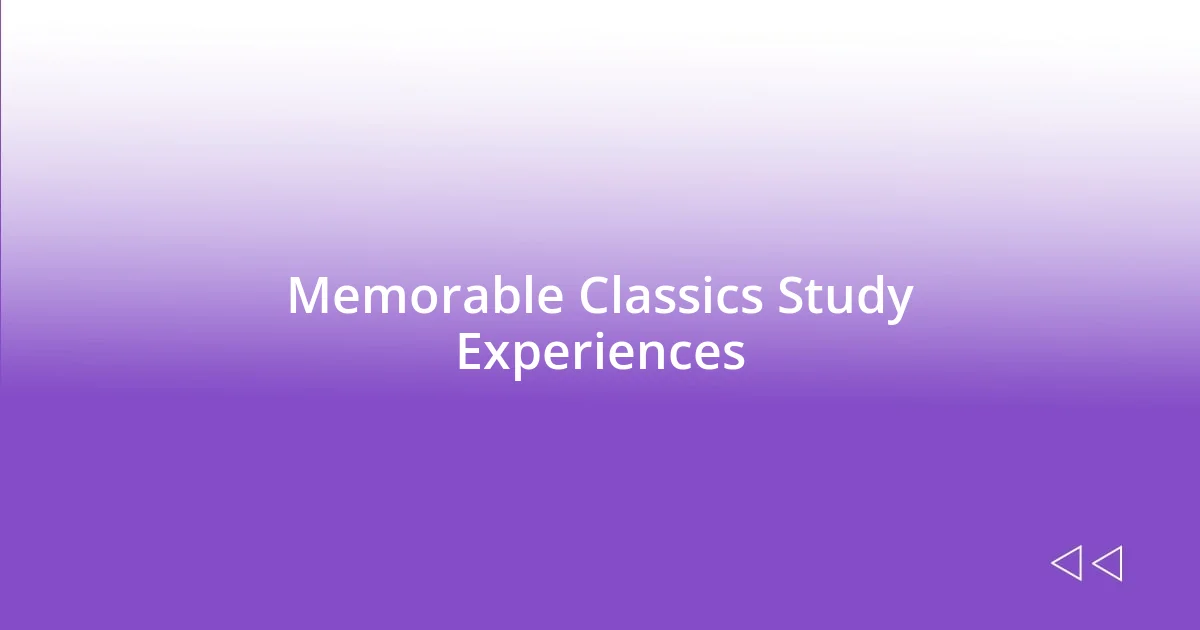
Memorable Classics Study Experiences

Memorable Classics Study Experiences
One of my favorite study experiences took place during a college seminar on ancient Greek literature. I still remember the way our professor passionately discussed “The Iliad,” and how he encouraged us to think critically about the motivations behind Achilles’ rage. It became a deeply engaging discussion, and I loved how we pulled apart the layers of human emotion woven into every line. It felt as if we weren’t just reading a story, but exploring timeless aspects of our own humanity. Have you ever participated in a class that changed the way you viewed a piece of literature?
- Participating in heated debates about “Oedipus Rex,” where emotions ran high as we grappled with fate versus free will.
- Attending a workshop where we performed scenes from Greek plays, reconnecting with the raw power of ancient theater.
- Joining a literature club where we challenged each other to find modern parallels in classic texts, igniting lively conversations over coffee and books.
I’ll never forget the reading weekend we organized for “The Great Gatsby.” We draped ourselves in 1920s attire and hosted a themed dinner, complete with jazz music. As we read passages aloud, the atmosphere transformed into a living scene from the book. That experience truly illustrated how classics could bridge the past with our present, creating a unique sense of camaraderie among us. Have you ever immersed yourself so deeply into a story that it transcended the pages?
- Sharing personal reflections over the symbolism of the green light with friends, sparking conversations that stretched late into the night.
- Crafting an art project inspired by the themes of ambition and loss, which deepened my understanding of the characters’ motivations.
- Volunteering at a local library for a “Classics for Kids” program, where I drew connections between classic tales and the children’s stories they loved.
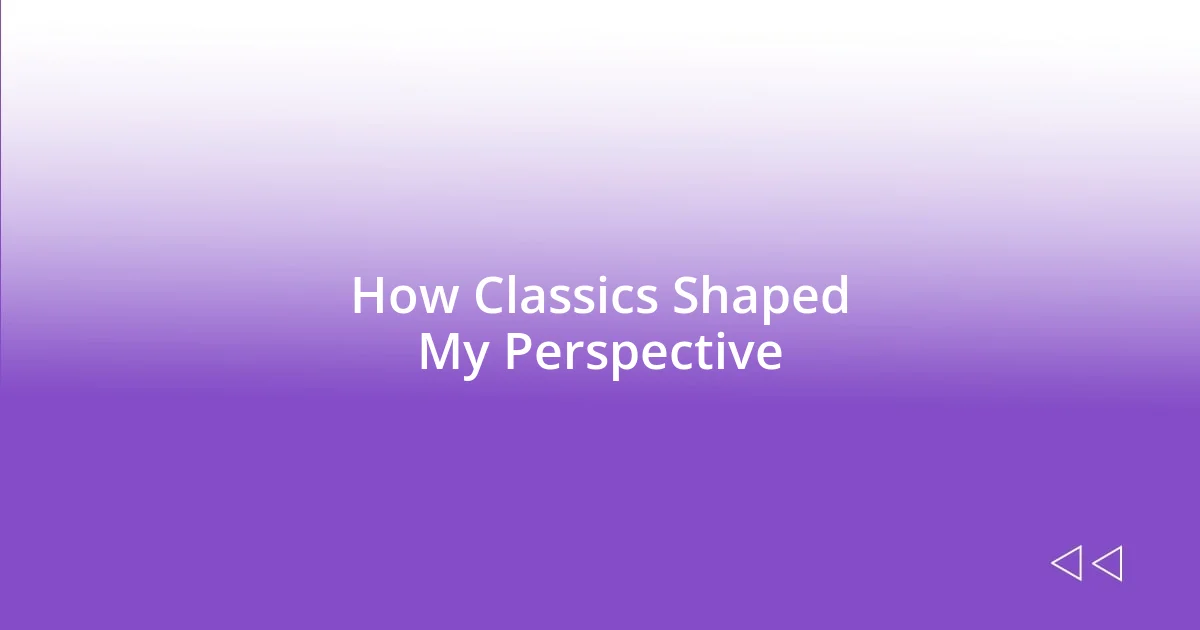
How Classics Shaped My Perspective
As I immersed myself in classic literature, I quickly realized how these books challenged my view of the world. Reading “The Picture of Dorian Gray” made me confront the idea that our choices shape who we are, prompting self-reflection on my values and integrity. Can literature really change how we see ourselves? In my case, it profoundly did.
Classics taught me empathy in a way I hadn’t anticipated. During my first read of “To Kill a Mockingbird,” I found myself deeply moved by Scout’s innocence and the inherent complexities of human morality. The characters felt like mirrors reflecting society’s flaws, leading me to examine my own biases. Have you ever had a character make you rethink your perspective? For me, it became a catalyst for personal growth.
Moreover, grappling with existential themes in works like “Crime and Punishment” left me pondering life’s meaning—an exploration that often felt intense but rewarding. I remember discussing Raskolnikov’s moral dilemmas with friends late into the night, our debate oscillating between right and wrong in a world that often feels gray. How often do we stop to consider the moral implications of our choices? Engaging with these classics has not only shaped my perspective but also instilled a sense of responsibility to think critically about my actions in the broader tapestry of life.
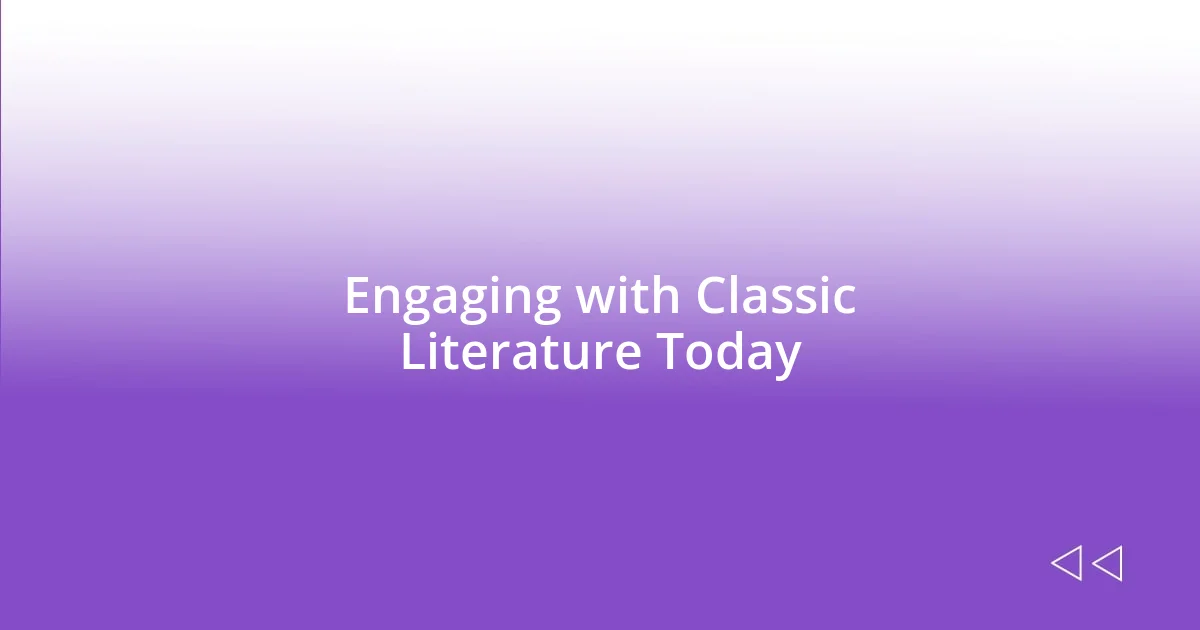
Engaging with Classic Literature Today
Engaging with classic literature today feels like a breath of fresh air amidst our fast-paced digital lives. I often find myself lost in the pages of “Pride and Prejudice,” where Elizabeth Bennet’s sharp wit and fierce independence resonate more than ever. It sparks a reflection: are we not all searching for our own truths in a world filled with distractions?
I recall attending a modern adaptation of Shakespeare’s “Romeo and Juliet,” where the timeless story was set against a backdrop of contemporary issues like social media and identity. It was fascinating to see how love and conflict remain relevant, transcending both time and space. Have you ever experienced a reinterpretation of a classic that shifted your perspective? For me, it enriched my understanding and appreciation for the original work.
Moreover, through online forums and social media, I engage with others who share my passion for classics, creating a vibrant community around shared insights and interpretations. I’ve found that discussing themes, like the struggle for identity in “Frankenstein,” adds layers to my comprehension that I might not achieve alone. How does sharing these experiences enhance our connections to classic literature? For me, it transforms reading from a solitary activity into a collective journey of discovery.
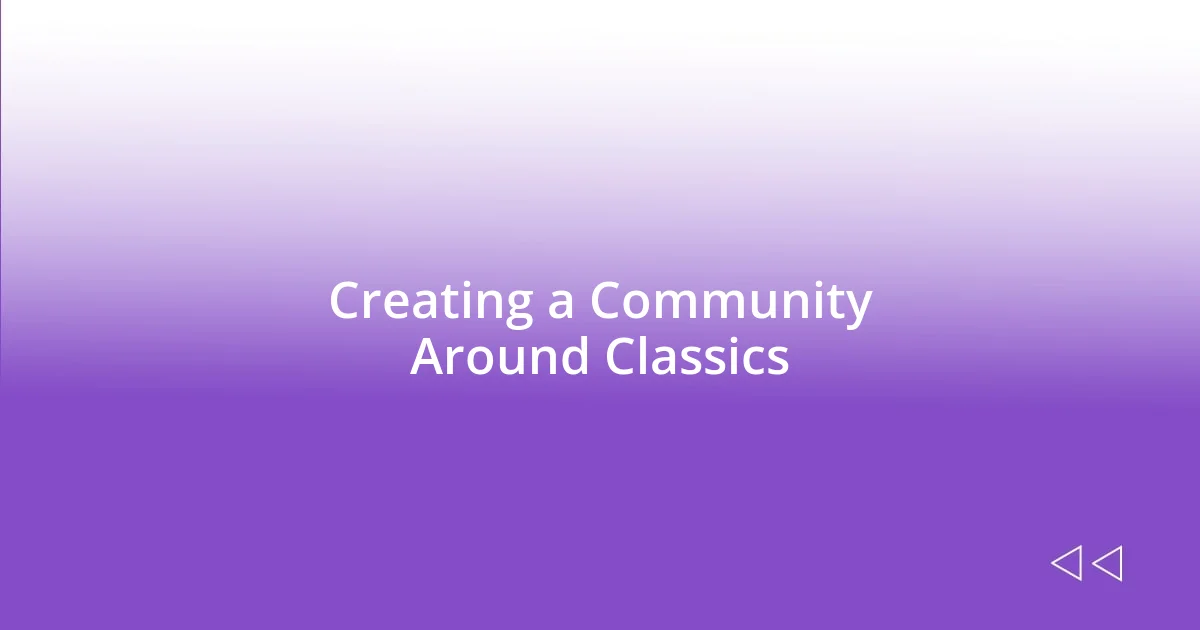
Creating a Community Around Classics
Creating a community around classics has become one of my favorite aspects of this literary journey. I remember the first time I joined a local book club focused on classic novels. Sitting in a cozy coffee shop, I felt a rush of excitement as we shared our thoughts on “Wuthering Heights.” It was incredible to see how each person brought a unique perspective to the discussion. Have you ever been in a conversation where every opinion felt like a new lens through which to view a beloved book? That experience solidified the idea for me that classics resonate differently with each individual.
Connecting with others who love classic literature deepens my understanding and appreciation. I often find myself exploring platforms like Goodreads and Instagram, where readers discuss their favorite moments from Dickens or Austen. I distinctly recall participating in an online challenge where we shared passages that moved us. The flood of emotions this sparked reminded me of why these texts endure through generations. Isn’t it fascinating how a few well-placed words can evoke such strong feelings? Sharing these insights creates a thrilling backdrop for exploration and connection with one another.
Also, I’ve noticed that creating events, like “classic movie nights,” brings literature to life in unexpected ways. I hosted a screening of “The Great Gatsby” at my home, where we dressed in 1920s fashion and discussed the themes of decadence and the American Dream. The laughter and spirited debates, coupled with the visuals of the film, enriched our understanding of Fitzgerald’s work. Have you thought about how experiential events can amplify the impact of literature? It’s these gatherings that have turned my love for classics into a tight-knit community centered around shared passion and exploration.
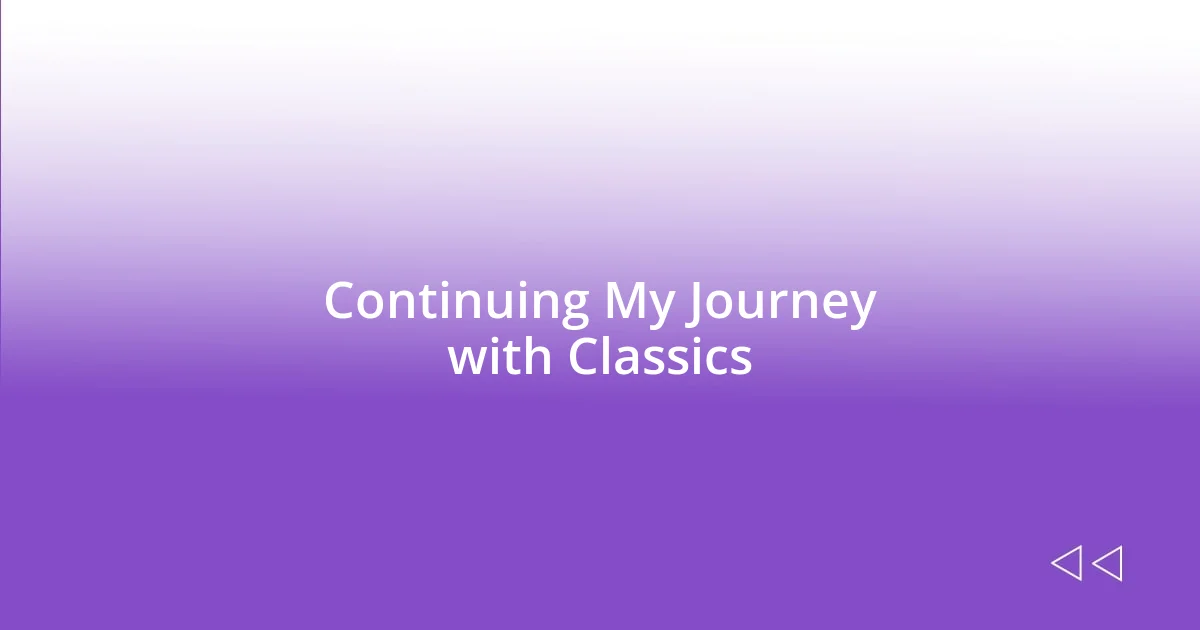
Continuing My Journey with Classics
Embracing my journey with classics has opened up avenues I never anticipated. I recently discovered a nearby theater that stages plays based on classic literature, and attending one felt like stepping into another era. Watching “The Importance of Being Earnest” unfold on stage brought Wilde’s wit alive in a way that reading alone couldn’t. Have you ever had an experience where a story leaped off the page and danced in your mind? For me, it was a reminder of how classics maintain a pulse in the modern world.
Another aspect I cherish is curating my reading list to include lesser-known classics. I dove into “The Portrait of a Lady” and was struck by Isabel Archer’s struggle for independence, echoing the dilemmas many face today. It’s thrilling to unearth these hidden gems and share them with friends. I often ask myself: how many beautiful narratives are waiting for us just outside the mainstream? The excitement of discovery fuels my journey, allowing me to connect the dots between past and present.
I’ve also started creating themed playlists inspired by characters and stories from the classics I read. It’s an unusual practice, but pairing music with literature enriches the experience exponentially. For example, crafting a playlist around “The Picture of Dorian Gray” helped me explore the interplay of beauty and morality in a more profound way. Have you ever found a song that perfectly encapsulated a character’s journey? This blending of art forms has added a vibrant layer to my understanding of classics, transforming my reading adventures into a multi-sensory experience.
